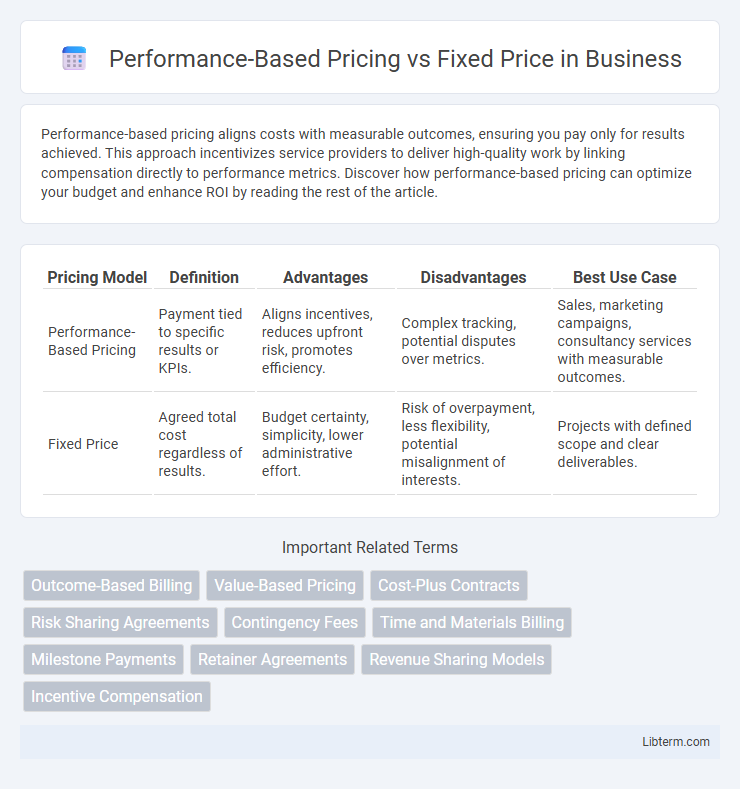Performance-based pricing aligns costs with measurable outcomes, ensuring you pay only for results achieved. This approach incentivizes service providers to deliver high-quality work by linking compensation directly to performance metrics. Discover how performance-based pricing can optimize your budget and enhance ROI by reading the rest of the article.
Table of Comparison
| Pricing Model | Definition | Advantages | Disadvantages | Best Use Case |
|---|---|---|---|---|
| Performance-Based Pricing | Payment tied to specific results or KPIs. | Aligns incentives, reduces upfront risk, promotes efficiency. | Complex tracking, potential disputes over metrics. | Sales, marketing campaigns, consultancy services with measurable outcomes. |
| Fixed Price | Agreed total cost regardless of results. | Budget certainty, simplicity, lower administrative effort. | Risk of overpayment, less flexibility, potential misalignment of interests. | Projects with defined scope and clear deliverables. |
Understanding Performance-Based Pricing
Performance-Based Pricing aligns costs with measurable outcomes, ensuring clients pay only for actual results achieved, such as increased sales or improved efficiency. This model fosters accountability and incentivizes providers to optimize performance continuously, contrasting with Fixed Price, which requires pre-agreed fees regardless of project success. Understanding Performance-Based Pricing involves evaluating key performance indicators (KPIs) and defining clear metrics to track progress and validate payment triggers.
What is Fixed Price Pricing?
Fixed price pricing involves setting a predetermined cost for a product or service, agreed upon before the project begins, regardless of the actual time or resources used. This pricing model provides clients with budget certainty and minimizes financial risk by locking in costs upfront. Common in industries like construction and software development, fixed price contracts emphasize clear project scope and deliverables to avoid cost overruns.
Key Differences Between Performance-Based and Fixed Price Models
Performance-based pricing links compensation directly to measurable results, incentivizing high performance and risk-sharing between client and provider, whereas fixed price models establish a set fee regardless of outcomes, providing cost predictability but less flexibility. Performance-based models require clear metrics and robust tracking systems to evaluate success, contrasting with fixed price contracts that emphasize scope definition and upfront agreement on deliverables. Businesses choosing between these models must weigh the trade-off between risk management and motivation for exceptional results.
Advantages of Performance-Based Pricing
Performance-Based Pricing aligns costs with measurable results, ensuring clients pay only for achieved outcomes, which enhances budget efficiency and incentivizes service providers to maximize performance. This model promotes transparency and accountability, as payment depends on meeting predefined key performance indicators (KPIs), reducing the risk of overspending. Moreover, it fosters a collaborative partnership between clients and vendors, driving continuous improvement and innovation to reach mutually agreed-upon goals.
Pros and Cons of Fixed Price Agreements
Fixed price agreements provide budget certainty by setting a predetermined cost, minimizing financial risk for clients and simplifying contract management. However, they can lead to limited flexibility, making it difficult to accommodate changes or unforeseen challenges without renegotiating terms or incurring additional costs. This pricing model may also incentivize contractors to under-scope projects to protect profit margins, potentially compromising quality or delaying delivery.
When to Choose Performance-Based Pricing
Performance-based pricing is ideal for projects with clear, measurable outcomes and when clients seek alignment of vendor incentives with results, such as marketing campaigns or software development with defined KPIs. This model suits scenarios where risk-sharing between client and provider is preferred, enabling flexibility and motivation for superior performance. Fixed price contracts are better for projects with well-defined scopes and minimal uncertainties, ensuring budget predictability and simplified contract management.
Ideal Scenarios for Fixed Price Contracts
Fixed price contracts are ideal for projects with well-defined scopes, clear deliverables, and predictable timelines, ensuring budget certainty and minimizing financial risks for clients. These contracts suit industries like construction, software development with stable requirements, and manufacturing, where changes are minimal during execution. Clients benefit from fixed price agreements when project objectives and specifications are stable, reducing the need for ongoing scope adjustments and facilitating straightforward contract management.
Risk Management in Both Pricing Strategies
Performance-based pricing transfers risk to the contractor by linking payment to project outcomes, incentivizing efficiency but exposing the provider to unforeseen cost overruns. Fixed price contracts place the risk predominantly on the contractor to deliver within a set budget, potentially leading to tighter cost controls but reduced flexibility for scope changes. Effective risk management in both strategies requires thorough project scoping, clear performance metrics, and contingency planning to balance cost certainty with quality and delivery.
Impact on Client-Vendor Relationships
Performance-Based Pricing fosters stronger client-vendor relationships by aligning incentives with deliverables, enhancing trust through measurable outcomes and shared risks. Fixed Price models can create tension due to rigid cost expectations and potential scope disputes, often limiting collaboration and flexibility. Choosing performance-based agreements encourages transparency and adaptability, leading to more sustainable, cooperative partnerships.
Choosing the Right Pricing Model for Your Business
Performance-based pricing aligns costs with measurable results, fostering motivation and accountability while reducing upfront risk for clients. Fixed price offers predictable budgeting and simpler contract management, ideal for projects with well-defined scopes and minimal variability. Evaluate your business's project complexity, risk tolerance, and client preferences to determine whether outcome-driven incentives or cost certainty better supports sustainable growth and client satisfaction.
Performance-Based Pricing Infographic

 libterm.com
libterm.com